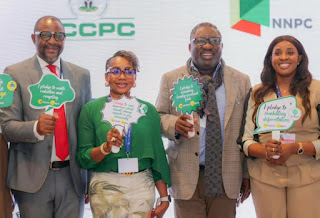At the just-concluded United Nations Climate Change Conference (COP29) side event, organized by Vivacity Development in collaboration with Ororo Waste Management, key participants emphasized the urgent need for youth upskilling and reskilling—particularly among Nigerian and African youth—to meet global demands in the evolving green economy.
The event, which attracted prominent personalities from diverse fields, focused on the future of work, highlighting how societies can adapt to shifts in green industries, embrace innovative solutions, and equip workforces with essential green skills.
Marianne Overton, spokesperson on climate and energy for the Council of Europe Municipalities and Regions, underscored the importance of environmental security and education as drivers of sustainable change. “Education is the precursor of real change and the tool that makes it happen. Partnerships between businesses and colleges can empower local economies by creating smarter workforce solutions,” she noted. Overton also pointed to growth areas like renewable energy, waste management, and climate finance, stressing that all jobs will eventually require "green" credentials.
Mr. Olumide Idowu, Executive Director of ICCDI Africa, highlighted the role of civil society organizations in promoting access to green skills training for underrepresented communities. He encouraged youth to take proactive steps in sustainable development through innovative strategies and partnerships.
Innocent Edemhanria, Programme Manager of Africa Network for Environment and Economic Justice (ANEEJ), shared insights into innovative solutions to environmental challenges, emphasizing reforestation, mangrove restoration, and sustainable agriculture. He highlighted how renewable energy initiatives like solar microgrids and biogas created jobs and reduced fossil fuel dependence. Oil spill prevention through bioremediation and smart monitoring was also discussed. Edemhanria noted that investing in clean energy technologies and renewables supported sustainability and job creation.
Fred Njehu, Pan-Africa Political Strategist at Greenpeace Africa, stressed the importance of collaborative political strategies in fostering sustainable development and green job creation. He shared examples of Greenpeace Africa's initiatives to advance environmental sustainability and boost economic opportunities in the green sector.
Sohaila Nasser, Development Coordinator and Sustainability Specialist at YLE Foundation, discussed the integration of green skills in industries resistant to adopting sustainable practices. She shared innovative initiatives aimed at equipping the workforce with skills needed for the green economy’s demands.
Major partner and collaborator, Ororo Waste Management in its showcase of its biofuels feedstock aggregation activities in Nigeria, showed the viability of good carbon projects on the continent.
Their work in the aggregation and processing of feedstock has the potential for large scale green job creation and capacity building and green technology development in Nigeria
Engr. Oluwakemi Ann-Melody Areola, the convener of the COP29 side event, emphasized the transformative impact of the event's resolutions on millions of youth across Africa. She called on governments to domesticate the ideas developed at the conference to align with their countries' unique demands.
With the rapid advancements in green technology and the growing emphasis on sustainability, participants urged stakeholders to act swiftly in equipping the workforce with relevant skills, ensuring global competitiveness, and fostering a sustainable future.











